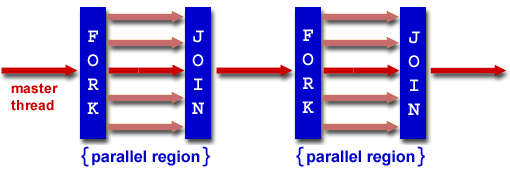 Shared Memory, Thread Based Parallelism:
Shared Memory, Thread Based Parallelism:
- OpenMP is based upon the existence of multiple threads in the shared
memory programming paradigm. A shared memory process consists of
multiple threads.
 Explicit Parallelism:
Explicit Parallelism:
- OpenMP is an explicit (not automatic) programming
model, offering the programmer full control over parallelization.
 Fork - Join Model:
Fork - Join Model:
- OpenMP uses the fork-join model of parallel execution:

- All OpenMP programs begin as a single process: the
master thread.
The master thread executes sequentially until the
first parallel region
construct is encountered.
- FORK: the master thread then creates a team of
parallel threads
- The statements in the program that are enclosed by the parallel
region construct are then executed in parallel among the various team
threads
- JOIN: When the team threads complete the statements in the parallel
region construct, they synchronize and terminate, leaving only the master
thread
 Compiler Directive Based:
Compiler Directive Based:
- Most OpenMP parallelism is specified through the use of
compiler directives which are imbedded in C/C++ or Fortran source code.
 Nested Parallelism Support:
Nested Parallelism Support:
- The API provides for the placement of parallel constructs inside of
other parallel constructs.
- Implementations may or may not support this feature.
 Dynamic Threads:
Dynamic Threads:
- The API provides for dynamically altering the number of threads which
may used to execute different parallel regions.
- Implementations may or may not support this feature.
 I/O:
I/O:
- OpenMP specifies nothing about parallel I/O. This is
particularly important if multiple threads attempt to write/read from
the same file.
- If every thread conducts I/O to a different file, the issues are not
as significant.
- It is entirely up to the programmer to insure that I/O is conducted
correctly within the context of a multi-threaded program.
 Memory Model: FLUSH Often?
Memory Model: FLUSH Often?
- OpenMP provides a "relaxed-consistency" and "temporary" view of
thread memory (in their words). In other words, threads can "cache"
their data and are not required to maintain exact consistency with real
memory all of the time.
- When it is critical that all threads view a shared variable identically,
the programmer is responsible for insuring that the variable is FLUSHed
by all threads as needed.
- More on this later...
 Shared Memory, Thread Based Parallelism:
Shared Memory, Thread Based Parallelism:
 Shared Memory, Thread Based Parallelism:
Shared Memory, Thread Based Parallelism:
 Explicit Parallelism:
Explicit Parallelism:
 Fork - Join Model:
Fork - Join Model:

 Compiler Directive Based:
Compiler Directive Based:
 Nested Parallelism Support:
Nested Parallelism Support:
 Dynamic Threads:
Dynamic Threads:
 I/O:
I/O:
 Memory Model: FLUSH Often?
Memory Model: FLUSH Often?